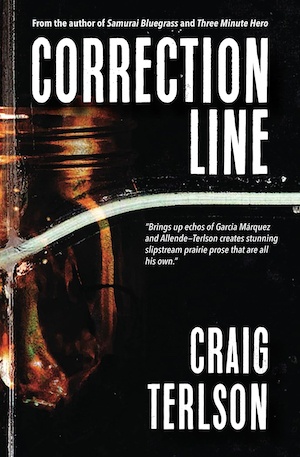
The new edition of Canadian author Craig Terlson’s Correction Line underscores how badly off track a person can get if they just keep doing what they’re doing.
The ‘correction line’ of the title refers to the late-19th century project to survey and divide the Canadian prairies into equal sections to prepare the land for agriculture and forestall possible US encroachment. However, the longitudinal meridians established in the survey would converge the further north they extended making truly square sections impossible to achieve. Correction lines were needed.
Just as the north-south lines would all converge on a single point, the characters in Terlson’s story all converge on a human nexus named Dave. Like a black hole, he draws people and their energy to him, with the ever-present likelihood of destruction. Being involved with Dave is extremely risky business. His career has gone from bringing in liquor, to marijuana, to hard drugs, to human trafficking. Not a good guy.
Dave doesn’t appear all that much in the story, yet he is everywhere in it. He’s the motivating force behind almost everything Terlson’s fascinating characters do. And, yet, in a cleverly ironic touch, though Dave encourages all manner of bad behaviour, he can’t abide bad language.
Terlson uses the wide open prairie of western Canada to great effect, as the characters range over its empty spaces in their pickup trucks and old Dodges and Pontiacs. Much of the novel is set several decades ago, and in my mind’s eye I saw sizable cars – no compact cars and every one a gas-guzzler – cruising the surveyors’ grid and taking the gentle curves – the correction lines – that adjust the strict geometry. He describes the stunning sunrises, the farm fields and grasslands that stretch to every horizon, the occasional clusters of trees that interrupt the flat plane, the lonely dwellings and, at close of day, the orange, red and purple sunsets. When it seems you can see forever, the sky becomes more present.
All Terlson’s description is much more than painting a pretty picture. You need this solid grounding in the familiar realities of fields and ditches and sky, because what the characters are up to will stretch your perspective. Also, since the novel unrolls in a non-linear way, the familiar helps keep you oriented.
A young woman named Lucy has had a relationship with Dave in the past, but she’s disappeared. He doesn’t know where. He has cancer, and he wants her back. Alive. Lucy’s late mother made a strange potion he thinks will cure him, and Lucy makes something similar, but does it work? Dave puts his best man, Lawrence, on the job. Lawrence recruits the rootless Curtis, a bowling hustler, to accompany him in the search for Lucy.
Roy is a failed door-to-door encyclopaedia salesman who sees short movies on the dark screen of his one blind eye. Many of them feature a white-haired man he’s never met. He knocks on Lucy’s door and, though sceptical a set of encyclopaedias will be sold, visits her a second time. She’s not home, but he hears her dog Delta barking in the basement, and he goes down to check on her. What he finds are strange glowing jars lining the shelves and Delta locked up. Lucy can’t have gone far.
Whether Lucy can replicate her mother’s strange mixture or not, her real talent is precognition. Maybe she doesn’t know exactly what is going to happen, but she knows that something bad is heading her way. And it isn’t Roy. It’s Lawrence and Curtis. And Christo, another operative Dave has sent to make sure the job gets done, though the ‘alive’ part of the mission hasn’t really registered with Christo.
Roy is a good guy, in way over his head, with the opportunity to do something worthwhile for a change. He also has a sixth sense when trouble is brewing, and his instincts are reinforced by those of Lucy’s dog Delta. Of course, this realisation isn’t much of a stretch, as there’s plenty of danger when violent armed men are lurking about. Houses get destroyed. Cars, even big ones, don’t have a chance. Hospitals are visited.
Much of the drama plays out along the roads surrounded by those endless fields and, as you gradually get to know each of these characters, you come to like most of them too. You may yearn for their travels to make the slight angle of correction that would bend their lives in new directions.
This is a second, revised edition of Craig Terlson’s first novel, which he worked on for a decade, and he calls it “…the longest and most arduous chess game of my life.” At the book’s end, he adds a pair of short stories that reinforce and echo some of the novel’s themes, but with different characters. A kind of ‘pass the chocolate’ end to a good meal.
For more road trips see Blood Like Mine by Stuart Neville or The Great Gimmelmans by Lee Matthew Goldberg.
Ethelbert House
Print/Kindle
£3.89
CFL Rating: 4 Stars